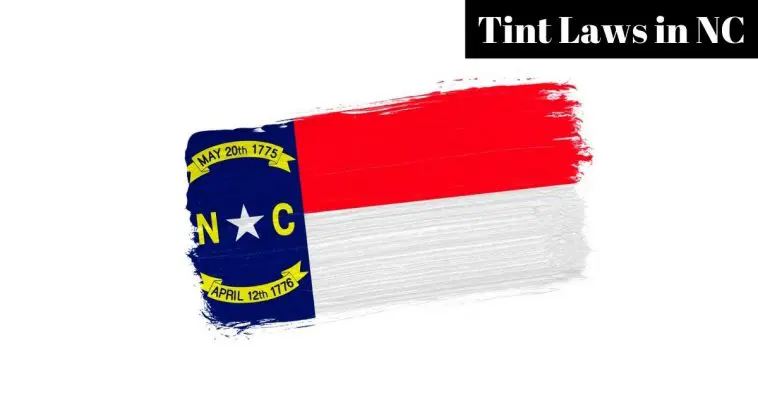There are several functions to using tinted car windows. Some have metallic components with a resemblance to sunglasses lenses.
They help to abate heat and flash caused by visible light, as well as reflect inbound light. But of course, it also makes your car look glassy.
Before deciding to tint your windows, make sure it is done securely. Most importantly, it should be consistent with North Carolina window tint law (legislated in 2001).
No matter how displeasing the idea or how tiring the process is, it will give you suitable protection while on the road.
Here’s everything you need to know about window tint laws in North Carolina before you embark on your next road trip.
TABLE OF CONTENTS
Are You Allowed To Have Tinted Windshield And Windows In North Carolina?
North Carolina do permits vehicles to have tinted windshields and windows, providing it conforms to the law.
A safety inspection will be conducted, with an extra charge of $10 in addition to the standard $27.20 (fee varies), to make sure car owners meet the state regulation (G.S. 20-127).
Tint darkness is quantified through a percentage of Visible Light Transmission or VLT%. It designates the crossable amount of visible light that can traverse the window of your car.
What Is The Darkest Tint You Can Legally Get In NC?
There is a high demand for dark tint among vehicle enthusiasts – around 50 to 70 percent visible light transmission.
North Carolina emphasizes that window tints should not be darker than 32% VLT. The measurement is done using a North Carolina-authorized meter.
Therefore, making it one of the more temperate states within the US region. It applies to all vehicles without exemption.
Is 20% Tint Illegal In NC?
Tint percentages can range anywhere from 10 to 90%, although it could also be as low as 5%. In North Carolina, a 20% tint is considered illegal.
It can be extremely dark, but you can still clearly see the outside view and the inside of a car. Many settle for 20% tint as a form of protection against the dangerous UV sun rays.
Can You Get Pulled Over For Tinted Windows In North Carolina?
North Carolina can tolerate up to 35% visible light transmission. Anything beyond could get the attention of a law enforcement officer, pull your car over, and hand you a ticket for window tint violation. The new law specifies that window tint needs at least 70% of light to pass through.
The same goes for the windshield. It should be non-reflective and only has 5 inches under the AS1 line or directly above the windshield. It helps to prevent vision impairment while driving.
You may notice that some cars have tinted windows exceeding 35% VLT, while others have blacked-out windows. They are often noticeable on limousines, and yes, even on police vehicles.
Before you wince at the idea, it is crucial to understand that there are exceptions and limitations to North Carolina window tint laws.
On top of law enforcement cars and limos, vehicles that are free from the strict 32 to 35% VLT are as follows:
- Motor homes (G.S. 20-4.01 27f)
- Property shipping services with rear windows (G.S. 20-4.01 31)
- For-hire and excursion passenger vehicles (G.S. 20-4.01 27a)
- Ambulances (G.S. 20-4.01 27d2)
- Vehicles with a medical exception
- Multipurpose vehicles intended to carry passengers (maximum of 10), a vehicle with unique features used for sporadic outdoor operation, or one that is built on a truck chassis (examples are SUV and mini-van)
How Much Is A Tint Ticket In NC?
The total cost of a tint ticket can vary. For instance, did you past or ignore warnings (fix tickets) indicating to lift off the tint?
How much darker your window tint is could also be a determining factor for the amount you will need to pay. But in general, you may expect to shell out less than $300.
A tint ticket is usually a minor violation, and reducing the ticket charge is likely possible as long as you take immediate action after getting pulled over. Otherwise, prepare your pocket for further costs.
The fee will go sky-high whenever you are pulled over, and you still have pending tint tickets to settle. Late fees and added court processing payments could all add up.
There are usually three ways to beat the window tint ticket. You can fix the problem by consulting a traffic law attorney, requesting an exemption, or pleading not guilty.
Window Tint Darkness In North Carolina
The higher the visible light transmission is, the more light to cross through the tint film. So, a 5 percent tint is much darker compared to 50 or 70 percent.
For Passenger Vehicle
- Windshield – non-reflective above the As1 line or top five inches
- Front Side Windows – should allow at least 35% of light
- Back Side Windows – should allow at least 35% of light
- Rear Window – should allow at least 35% of light
For MPV (Multi-Purpose Vehicle)
- Windshield – non-reflective above the AS1 line of top five inches
- Front Side Windows – should allow at least 35% of light
- Back Side Windows – can use any light transmission
- Rear Window – can use any light transmission
Window Tint Reflection In North Carolina
North Carolina also sets a strict standard when it comes to window tint reflection.
For Passenger Vehicle
- Front Side Window – should be 20% reflective
- Back Side Window – should be 20% reflective
For MPV (Multi-Purpose Vehicle)
- Front Side Window – should be 20% reflective
- Back Side Window – should be 20% reflective
How Do You Get A Medical Exemption For Window Tint In North Carolina?
People with light sensitivity and require darker window tints are encouraged to apply for a medical exemption certificate provided by the Drivers Medical Evaluation Program.
Your doctor will fill out the medical paperwork on your behalf. Permits are effective for up to five years and are not exchangeable.
Conclusion
North Carolina retains a few more laws concerning window tints. It is always recommended to understand each law carefully before tinting your car windows and adhere to these regulations. Doing so will let you enjoy a jubilant road tour all year round.




